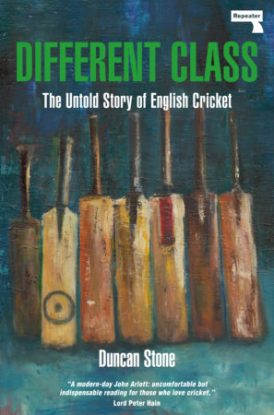Different Class: The Untold Story of English Cricket
Martin Chandler |Published: 2022
Pages: 325
Author: Stone, Duncan
Publisher: Repeater Books
Rating: 4 stars

Cricket has been a source of fascination to me throughout my life. It cast its spell over me when I was a child and has never let go. Duncan Stone has been similarly affected by the greatest of all games but, an academic historian, he has spent a great deal of his time looking behind what is in the shop window, and as result of that research has written Different Class, an absorbing and well timed analysis which brings sharply into focus how the game has, for all its appeal, found itself facing its current travails.
Histories of cricket, and particularly those concentrating on the English game, are not uncommon, but in the past they have always looked at the game from the top down, rather than the bottom up. Taking such an approach leads to most of those books concentrating on just a tiny fraction of the actual cricket played, to the exclusion of the overwhelming majority of the cricketing encounters that take place up and down the country and, subject to disruption in 2020, year in and year out. By looking at the question from the traditional viewpoint it is unsurprising that most previous writers have ended up presenting a somewhat distorted picture.
Recreational cricket has, in the past, been a rather neglected backwater of cricket literature. That has changed in recent years, but the sort of books that have sold well and received critical acclaim tend to be those reflecting the experience of individual club cricketers. The best of those books do contain real insights into the way club cricket in England works, but generally their function is to entertain rather than educate, and they are not therefore in the same category as Different Class.
Hailing from leafy Surrey, and now employed at the University of Huddersfield in Yorkshire, author Stone has experienced club cricket at both ends of England, and his first task is to give the lie to the ingrained idea that the likes of me had always taken as read. That is the traditional stereotyping observation that in the northern half of the country club cricket was played in the hard school of leagues, whereas in the south all club matches were friendlies that scrupulously observed the so called spirit of cricket, that elusive concept that we all know about, but which has never been entirely satisfactorily defined.
I suppose it was inevitable that such a generalisation was barely a half truth, and if nothing else to learn the reality of how the grass roots of the English game have developed is an interesting journey. There are comparisons drawn with other sports and, just occasionally, a nod towards the generally very different history of the First Class and international game before, in the closing chapters, a disturbing enlightenment unfolds.
Like many others I have, over the last few weeks, been disappointed to say the least in the news that has emerged about the way in which Azeem Rafiq was treated in his time as a Yorkshire player. It was with much sadness that I watched what amounted to the entirety of the English game face trial by media and come out of the examination so grievously discredited.
The one feature of the story that I struggled with at the time it hit the headlines was the fact that when, over recent years, as I not infrequently do, I stop by playgrounds, parks and club grounds to watch a bit of cricket, the majority of the participants seem to be from the South Asian diaspora. How, I asked myself, could this possibly be indicative of a wider malaise and surely it demonstrated that, at least in recreational cricket, there were no problems of the sort that Azeem Rafiq and others have faced in the professional game?
The greatest service that Duncan Stone has done with Different Class is explained that one to me. The reality is that the way in which cricket is run at the top has been reflected in the way that the game is organised at its grass roots and there is much that still needs to be done to eradicate prejudice from cricket. The nettle is there to be grasped and if, as it should be, Different Class is widely read amongst those in a position to influence the game in England then perhaps the continuing damage being done to cricket can be stopped, and hopefully in time some of that that has been done can be undone.






Leave a comment